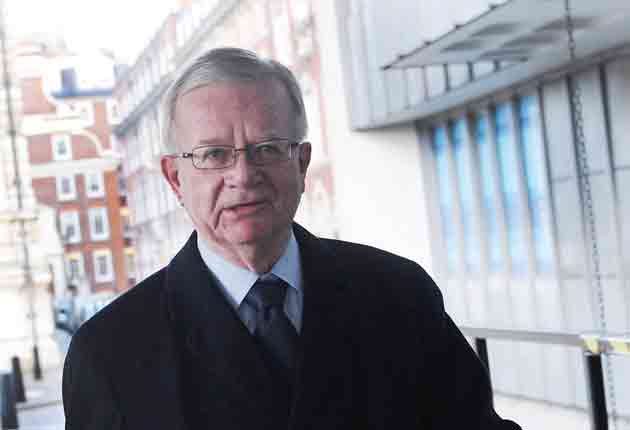Damaged but undaunted, ex-PM returns for one more grilling on Iraq

Your support helps us to tell the story
From reproductive rights to climate change to Big Tech, The Independent is on the ground when the story is developing. Whether it's investigating the financials of Elon Musk's pro-Trump PAC or producing our latest documentary, 'The A Word', which shines a light on the American women fighting for reproductive rights, we know how important it is to parse out the facts from the messaging.
At such a critical moment in US history, we need reporters on the ground. Your donation allows us to keep sending journalists to speak to both sides of the story.
The Independent is trusted by Americans across the entire political spectrum. And unlike many other quality news outlets, we choose not to lock Americans out of our reporting and analysis with paywalls. We believe quality journalism should be available to everyone, paid for by those who can afford it.
Your support makes all the difference.An unrepentant Tony Blair makes his final appearance before the inquiry into the Iraq war today, resigned to the fact that he will fail to draw a line under the most controversial decision of his premiership.
The former prime minister will face up to four-and-a-half hours of questions by the inquiry team chaired by former Whitehall mandarin Sir John Chilcot. They have recalled him to clear up inconsistencies between the evidence he gave in a six-hour grilling a year ago and that provided by other witnesses since.
Although allies insist Mr Blair is taking today's session seriously, his preparations have been much less forensic than a year ago, and have caused little disruption to his globetrotting lifestyle as Middle East peace envoy, star speaker, adviser to investment bank JP Morgan Chase and Swiss financial company Zurich. He also heads an inter-faith organisation and a sports foundation in the north-east. Blair Inc now employs about 120 people.
Mr Blair has not been locked in discussions with his former aides like last time, when he relived the dramatic countdown to the 2003 conflict. For the most part, he has prepared solo by studying the recent evidence to the Chilcot inquiry.
He is bound to be quizzed about the former Attorney General Lord Goldsmith's suggestion that his legal advice in the build-up to war was at odds with Mr Blair's public statements.
Mr Blair is likely to argue that Lord Goldsmith's "provisional" advice was just that, and that his journey towards his eventual approval of military action under UN Resolution 1441 has been well documented. It may be harder to answer Lord Goldsmith's claim that he was cut out of the negotiations on the resolution after expressing his initial doubts about the legality of war.
The former Labour premier also faces questions over private memos sent between him and the former US President George Bush before the invasion. The Cabinet Office blocked their release this week, prompting an uncharacteristic blast of disapproval from Sir John. His committee has seen the memos and will be able to ask broad questions about them but has been banned from publishing them.
Yesterday it emerged that Mr Blair had demanded a "silver bullet" of intelligence to put in the Government's dossier on Saddam Hussein's alleged weapons of mass destruction. A senior MI6 officer, known only as "SIS4", has revealed to the inquiry how the Secret Intelligence Service "strongly disliked" the idea of a dossier because publicising their work went against "all our training, our culture".
Mr Blair may also be challenged over evidence by Sir Stephen Wall, his former adviser, that Downing Street deliberately misquoted the French President Jacques Chirac that he would never back military action – when in fact he had not ruled that out. Blair allies insist that No 10's view was based on his regular contacts with M Chirac, not a half a sentence in an interview.
One word that is unlikely to pass Mr Blair's lips today is the S-word – "sorry". He looks set to disappoint those people, including the former British ambassador to Washington, Sir Christopher Meyer, who are advising him to display more contrition than he did in his first appearance before the inquiry.
Asked by Sir John before whether he had any regrets, Mr Blair replied that he took responsibility but refused to apologise. He worked out the alternative front pages in his mind: "at last he says sorry", or, looking like a "callous brute" indifferent to the suffering caused by the Iraq conflict.
In his memoirs, A Journey, Mr Blair admitted that merely taking responsibility was an "incomplete" answer, saying of his critics: "Do they really suppose I don't care, don't feel, don't regret with every fibre of my being the loss of those who died?" He pleaded with them to at least reflect whether he might have been right. But then he made that distant prospect even less likely by making clear he would support military action to prevent Iran acquiring nuclear weapons.
Earlier hopes among Blair allies that history would be kinder to him on Iraq show no sign of coming good. Privately, Mr Blair knows that people have long since made up their mind about Iraq and are unlikely to change their view now.
Subscribe to Independent Premium to bookmark this article
Want to bookmark your favourite articles and stories to read or reference later? Start your Independent Premium subscription today.
Join our commenting forum
Join thought-provoking conversations, follow other Independent readers and see their replies
Comments